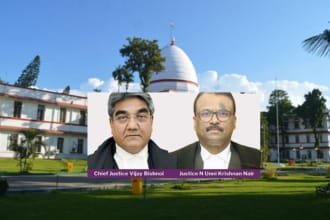In a significant development, the Supreme Court of India has granted bail to senior Congress leader and former Punjab Forest Minister, Sadhu Singh Dharamsot, in connection with a money laundering case under the Prevention of Money Laundering Act, 2002 (PMLA). The judgment, delivered by a Bench comprising Justice Sudhanshu Dhulia and Justice K. Vinod Chandran, marks a key turning point in a case that has garnered widespread political and legal attention in the state of Punjab.
Background: Bribery Allegations and ECIR Registration
The controversy surrounding Sadhu Singh Dharamsot first emerged in 2022, when he was booked by the Punjab Vigilance Bureau in a bribery case. The case centered around alleged irregularities and corruption during his tenure as the Forest Minister in the Punjab government. Acting on these allegations, the Enforcement Directorate (ED) later registered an Enforcement Case Information Report (ECIR) under the PMLA, culminating in Dharamsot’s arrest on January 15, 2024.
Interim Bail for Lok Sabha Campaigning
Despite the serious charges, Dharamsot was granted interim bail in May 2024 by the Punjab and Haryana High Court, primarily to allow him to participate in campaigning for the Lok Sabha elections. However, his request for regular bail was rejected by the same High Court in September 2024.
The High Court’s order was scathing in its observations. It described Dharamsot as the “kingpin” of the Forest Scam, pointing out that he had allegedly amassed disproportionate assets worth ₹6.39 crore. The Court stated:
“Prima facie, it is evident that the petitioner (while holding the Office of Forest Minister) collected huge proceeds of crime and laundered the same while projecting as untainted money through various modes. Apart from that, the petitioner accumulated disproportionate assets to the tune of ₹6,39,18,292.39/- as proceeds of crime and has utilized the same, projecting as untainted money.”
Following this setback, Dharamsot decided to challenge the High Court’s ruling by moving the Supreme Court.
Supreme Court’s Verdict: Bail Granted
The Supreme Court, after hearing arguments from both sides, granted bail to Dharamsot on April 15, 2025, more than a year after his arrest. The order offers a breather to the senior Congress leader, though it does not amount to a clean chit in the ongoing investigation.
Appearing for Dharamsot, Senior Advocate Abhishek Manu Singhvi, along with advocates Aman Panwar and Sumer Boparai, argued that the charges were politically motivated and that the petitioner had been languishing in custody for an extended period without trial. The defense emphasized that prolonged incarceration without the conclusion of trial amounted to a violation of Article 21 of the Constitution, which guarantees the right to life and personal liberty.
While the detailed reasoning behind the Supreme Court’s decision is awaited, the grant of bail indicates that the Court found sufficient grounds to permit Dharamsot’s release pending trial.
Legal Significance and Political Implications
The Supreme Court’s order in Sadhu Singh Dharamsot v. Directorate of Enforcement holds considerable significance for several reasons:
- Reinforcement of Bail Jurisprudence: The case reiterates the Supreme Court’s consistent stand that bail is the rule and jail the exception, particularly when trials are unlikely to conclude soon.
- Scrutiny of PMLA Proceedings: The decision also highlights ongoing concerns regarding the abuse of the PMLA for political vendetta. Several opposition leaders have in recent times faced PMLA cases, raising questions about selective targeting and misuse of investigative powers.
- Impact on Punjab Politics: Dharamsot’s release is likely to have political reverberations in Punjab, especially within the Congress party. The timing of his bail could influence voter perception, particularly in the context of allegations of corruption and the larger narrative of political victimization.
Key Takeaways from the Case
- Arrest and Custody: Dharamsot was in judicial custody for over a year, indicating the prolonged nature of PMLA investigations and the slow pace of trials in economic offenses.
- Disproportionate Assets Allegation: The case centers around assets allegedly disproportionate to his known sources of income, with the ED claiming these were laundered and projected as legitimate.
- High Court’s Refusal vs. Supreme Court’s Relief: The contrast between the Punjab and Haryana High Court’s firm stance and the Supreme Court’s leniency underscores the evolving standards of bail in economic offenses.
Legal Experts React
Several legal experts have weighed in on the case, noting that while economic offenses are serious in nature, extended pre-trial detention without sufficient progress in the trial process can be detrimental to due process.
Speaking anonymously, a senior criminal lawyer noted:
“The judiciary has to maintain a delicate balance between the interests of justice and personal liberty. In cases under PMLA, it’s crucial to ensure that bail is not denied as a punitive measure, especially when the accused is cooperating with the investigation.”
Conclusion
The Supreme Court’s decision to grant bail to Sadhu Singh Dharamsot is a landmark moment in a case that intertwines law, politics, and questions of personal liberty. While the trial is still pending and the allegations are yet to be tested fully in court, the judgment reinforces the constitutional commitment to fair trial and protection of individual rights under Article 21.
As the legal proceedings continue, this case will remain a focal point in the discourse around the PMLA, the use of investigative powers, and the boundaries of judicial discretion in bail matters.


